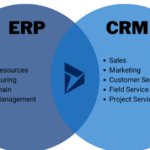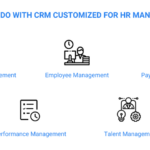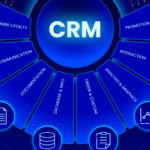A Guide to the Different Types of CRM Software
No matter your business’ industry, a loyal customer base is the only way to support your company’s survival in the long term. Whether you sell products or services, finding a way to keep tabs on how your customers experience what your company has to offer is vital.
Short of issuing annoying surveys or following up with every single customer to ask about his or her experience, how does a business improve its relationship with its clientele?

A Customer Relationship Management (CRM) system is a combination of practices and software to help stay on top of what keeps your customers coming back.
CRM systems automate various business procedures in order to increase efficiencies within the day-to-day tasks of the company and collect data on the customer experience. These two elements, when monitored, can lead to greater customer satisfaction.
For example, imagine you have a security system business requiring employees to go out to offices and homes for installation or maintenance services. Without a CRM, when a customer calls to ask for an ETA regarding his or her service technician, a business manager would have to hang up, call the technician, ask his or her whereabouts, and the call the customer back with an answer. With a CRM system with a GPS tracking feature, the swipe of a screen could answer the customer’s question on the spot.
Most of us do not appreciate playing “phone tag” which makes a feature like this a faster, more efficient way to serve a customer and boost trust in your company.
What can a CRM system really do to help businesses increase customer satisfaction?
When various administrative and daily due diligence tasks are automated, business managers have more time to focus on building good relationships with customers and creating promising new leads. If your business relies on field service technicians, you can’t accompany every single one on the job to make sure work is completed in a satisfactory way. Even shadowing one technician will take time away from developing better deals for your customers.
For example, if a CRM system includes integrated communication features, every essential employee will have a log to review of what has been said or what troubleshooting has occurred for any specific customer. To avoid delays with double-work or asking a customer the same questions he or she has already answered, a more streamlined work flow is created. This means less work on the labor side of the equation and more free time to work up an improved service for your clients.
CRM systems track your data in a way which makes it fast and easy to learn more about what your customers do and don’t want. For example, inventory features of a CRM system may track and report what has been purchased and what is consistently returned. This valuable information makes it faster to decide which products to stop ordering and which require back-stock in order to never run out. This reporting feature saves time and resources needed in hours and effort to draw up the same report on an Excel or Google sheet.
The three main types of CRM systems are known as Analytical, Operational, and Collaborative.
Depending on the focus of your business, one of the three main types of CRM systems may be more useful to you and your team.
Analytical CRM systems track large amounts of customer data to help businesses understand how to gain and keep customers. These CRM programs are designed to monitor the procedures of customer acquisition, retention, and various customer details. Acquisition data demonstrates how leads are converted to customers; retention information reveal how to keep customers happy and returning to your business; and customer details worth tracking include contact information, communications with the customer, and any information which helps improve your relationship to the customer. An analytical CRM system helps businesses learn all this information by reporting on customer behaviors, patterns, and complaints. This is critical knowledge for any business wanting to grow.
Operational CRM systems take a day-to-day management approach when it comes to basic operations, sales, and serving customers. Predictable, automated tasks are handled by the operational CRM software to include e-mails sent to new visitors or coupons offered to returning customers. Aspects of sales are automated to nurture the right leads following the right actions made by new prospects. Higher levels of customer service may be reached with an operational CRM system by automating helpful information with clear communication via any method preferred by the customer. Ideally, this level of administrative support helps to make more time for business development tasks.
Collaborative CRM systems focuses on enhancing the customer experience. This kind of CRM system will keep all essential personnel “in-the-know” on customer relations. Rather than calling meetings, making numerous texts or having several phone calls to keep everyone on the same page, a collaborative CRM system offers the information regarding a customer’s needs at the click of a button. Customer data is shared across the appropriate company channels so whoever picks up the next line of communication is ready to represent the company with all the relevant information (which means a customer will not have to repeat him or herself).
Start a free 30-day trial with the CRM Runner system to decide if this CRM is the right type of CRM system for your company.
CRM Runner offers several features to streamline every day operations, communication, and reports in one easy-to-use software program. From scheduling to tracking products and gathering critical data for business development and improved customer satisfaction, CRM Runner has a lot to offer industries across the board. While there is no one-size-fits all program for every business, CRM Runner stands behind its system with a 30-day trial to give your team a chance to experience the difference before committing to a package. Check out the features and start a free trial by signing up here.






0 Comments